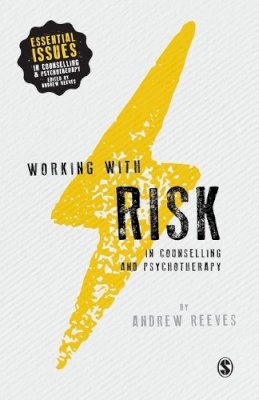
Working with Risk in Counselling and Psychotherapy
Andrew Reeves
The wide-ranging contexts in which counselling and psychotherapy is now practiced means clients present with a range of risks that therapists have to respond to. Risk is an ever-present issue for counsellors and psychotherapists and, in an increasingly litigious culture, the need for trainees to develop a sound understanding of how the right tools and the right knowledge can support their practice has never been greater. In this book Andrew Reeves takes trainees, newly qualified practitioners, and more experienced practitioners step-by-step through what is meant by risk, offering practical hints and tips and links to policy and research to inform good ethical practice along the way.
This book tackles:
• The definition of risk and how risk is linked to social, psychological and relational factors
• Working with those who are at risk of suicide, self-injury, self-harm and/or are an endangerment to others
• How therapists should respond to the risk in situations involving child protection, mental health crises, and in the therapeutic process itself
• The positive side of risk-taking
• How counsellors and psychotherapists can work with risk proactively and positively, informed by research.
Filled with case studies, ethical dilemmas, reflective questions, discussion questions and further reading, this book offers counsellors and psychotherapists guidance on how they can work with risk proactively and positively. It is an essential resource for all services, organisations and individual practitioners.
Product Details
About Andrew Reeves
Reviews for Working with Risk in Counselling and Psychotherapy
Dr Liz Coldridge In Working with Risk in Counselling and Psychotherapy, Reeves has provided an engaging, lucid and comprehensive exploration of a "multidimensional view of risk", posing critical questions and drawing substantially from clinical material in order to examine the nuances of this crucial concept. An invaluable resource for trainees and seasoned practitioners alike, the book combines a broad range of both practical and philosophical concerns, succinctly addressing a wealth of detail in order to elucidate our understanding.
Dr Susan Maise Strauss As Andrew Reeves points out, the term ‘risk’ is often used in our profession but is rarely defined with any clarity or depth. He offers useful definitions for the term and works systematically through a broad range of issues that might arise when working with risk in counselling and psychotherapy. As well as exploring the potential harm represented by risk Reeves also acknowledges the significance of positive risk taking within counselling and psychotherapy. Realistic vignettes along with well structured ‘pauses for reflection’ are used throughout the book to explore the issues that are discussed. This book is well researched and full of useful links and references for further reading. Overall the book instils confidence about this topic by informing the reader of the many facets of risk in counselling and psychotherapy.
David Taylor-Jones This is a well-structured book which deals with the following classes of risks: Situational; relational; contextual; professional; and personal... For anyone interested in the area, this is a good resource, fully up-to-date.
John Rowan Working with Risk is one in a series of books entitled ′Essential Issues in Counselling and Psychotherapy′. It covers the key essential issues around risk and I would strongly recommend it as essential reading, particularly for students in training, recently qualified counsellors and psychotherapists as well as those who are more experienced.
Julia Denington, lecturer, integrative psychotherapist and supervisor
